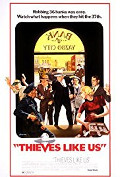
Directed by
Robert Altman
123 minutes
Rated M
Reviewed by
Bernard Hemingway

Thieves Like Us
Surprisingly Robert Altman did not know of Nicholas Ray’s 1948 film They Live By Night which like Altman’s film was based on a novel 'Thieves Like Us' by Edward Anderson until after he had made his own version.
Whereas Ray turned the Depression-era gangster film into a poignantly tragic love story by paring down most of the crime elements in order to focus on the two lead characters, Altman, bar the ending, sticks close to the original text. The result is turned very much towards the director’s taste for social historical portraiture, not a little through the use of contemporary radio broadcasts, particularly in the second half of the film, a technique which Altman would make the centre-piece of his final film, A Prairie Home Companion (2006).
Three convicts escape from a Mississippi prison farm and go on a bank-robbing spree. Along the way, the youngest, Bowie (Keith Carradine) falls for a naïve country girl (the incomparable Shelley Duvall. an Altman regular) who wants him to give up his criminal ways. Bowie cannot bring himself to break with his no-hoper buddies (Bert Remsen and John Schuck) despite realizing that only bad can come of it.
In many ways a deglamorised Bonnie And Clyde (1967), too much so in the scene when Bowie finally reaps the rewards of his ill-sown seeds, Altman’s film, scripted by Joan Tewkesbury and Calder Willingham, with help from the director, instead strips the legend of all sensationalism and romance, showing the life of Depression-era criminals on the run in all its tawdry drabness albeit with plenty of Altman's typically dry humour. Not a strategy likely to nurture box office success (it flopped commercially in its day) but admirable for its honesty even if Ray’s version is the more engaging film.
Want something different?





